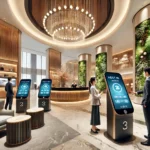Artificial intelligence (AI) is no longer a standalone technology in the hospitality industry. It’s rapidly becoming integral to various operations, redefining how hotels and motels function across marketing, guest experiences, and operations. By 2025, AI is expected to revolutionize the industry, bringing enhanced efficiency, personalization, and security. Here’s a closer look at how AI is shaping the future of hospitality.
“AI will change everything,” “It will literally change everything in the next two years, no matter what. And it’s going to touch every part of the industry.”
Here are some of the biggest applications expected of AI for 2025 according to experts in the field.
AI’s early days
Despite artificial intelligence’s potential to affect all aspects of the industry from sales and marketing to operations, the hotel industry still has a long way to go, AI is far behind in hospitality, and the reason that it is far behind is because of the disparate amounts of data that is siloed across many different platforms and systems,
Data is the fuel for AI and its large language models, so harnessing that data is key to better optimization. David Sjolander, vice president of HTNG operations at the American Hotel & Lodging Association, said he’s seen progress — and AI can help in data optimization, too.
“It is an industry with a huge amount of data, especially with guests who actually stay in our buildings for extended lengths of time, and we have never done a very good job of leveraging it in just about any way,” Sjolander said. “We’ve always had way more data than we know what to do with. I think it’s getting marginally better, and I think AI will help us with that, but we’re still at a fairly low maturity level in terms of data usage.”
Where the hotel industry has already made some progress is in the generative and predictive AI space. Hotels generate massive amounts of guest information, from booking preferences to in-house services. However, the challenge has always been how to leverage this data effectively. With advancements in data analytics and AI-driven tools, hotels are slowly improving their data management and optimization practices.
Other automation trends like robotics are similarly in their early days, with hotels not wanting to sacrifice the human element of hospitality.
“I think where you’ll see there is more and more use of robotics is in the back of the house for cleaning things that the guests don’t necessarily see or don’t care about,”
Cybersecurity Challenges and Opportunities
AI presents both opportunities and challenges in the realm of cybersecurity. On the positive side, AI can enhance data protection by detecting and preventing security breaches more efficiently. However, the same technology is also being exploited by hackers to launch more sophisticated attacks.
Recent ransomware incidents in the hospitality industry have highlighted the importance of robust cybersecurity measures. Hotels must invest in AI-driven security solutions and ongoing employee training to mitigate risks and safeguard sensitive guest information.
The Human Touch vs. AI Automation
One of the concerns in adopting AI in hospitality is the potential loss of the human touch. While automation can improve efficiency, guest experiences still thrive on personal interactions. AI should be seen as a tool to complement human services rather than replace them.
For example, while chatbots handle routine inquiries, hotel staff can focus on creating memorable guest experiences. AI can also assist staff by providing data-driven insights to anticipate guest needs and preferences.
Key Benefits of AI for Hotels
Guest Experience: AI can personalize guest interactions, from room preferences to tailored activity recommendations.
Operational Efficiency: Automation reduces the burden of repetitive tasks, freeing up staff for more value-added services.
Marketing Optimization: Predictive AI helps target the right audience with personalized offers, increasing conversion rates.
Data-Driven Decisions: AI analytics provide valuable insights to optimize pricing strategies, resource allocation, and customer engagement.
Improved Security: AI-powered security solutions help detect and prevent potential threats.
Preparing for an AI-Driven Future
To fully embrace AI’s potential, hotel and motel owners should take proactive steps:
Continuous Innovation: Stay updated on AI trends and adopt emerging technologies that align with your business goals.
Data Integration: Invest in systems that consolidate and analyze data from various touchpoints.
AI Training: Train staff to use AI tools effectively and understand the technology’s limitations.
Cybersecurity Investments: Implement AI-driven security solutions to protect guest data and hotel operations.
Guest-Centric AI Applications: Focus on AI tools that enhance the guest experience without compromising the human touch.


